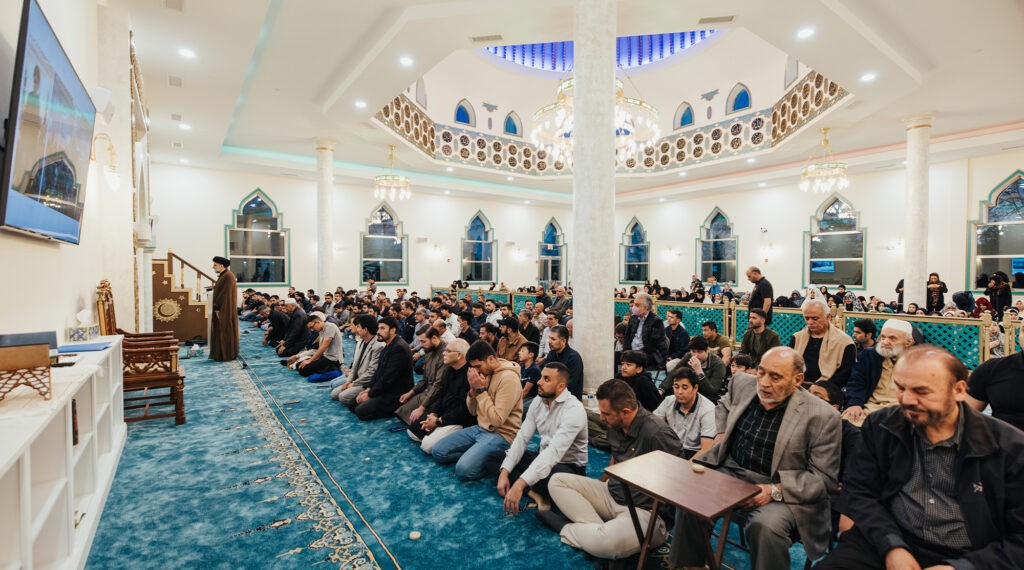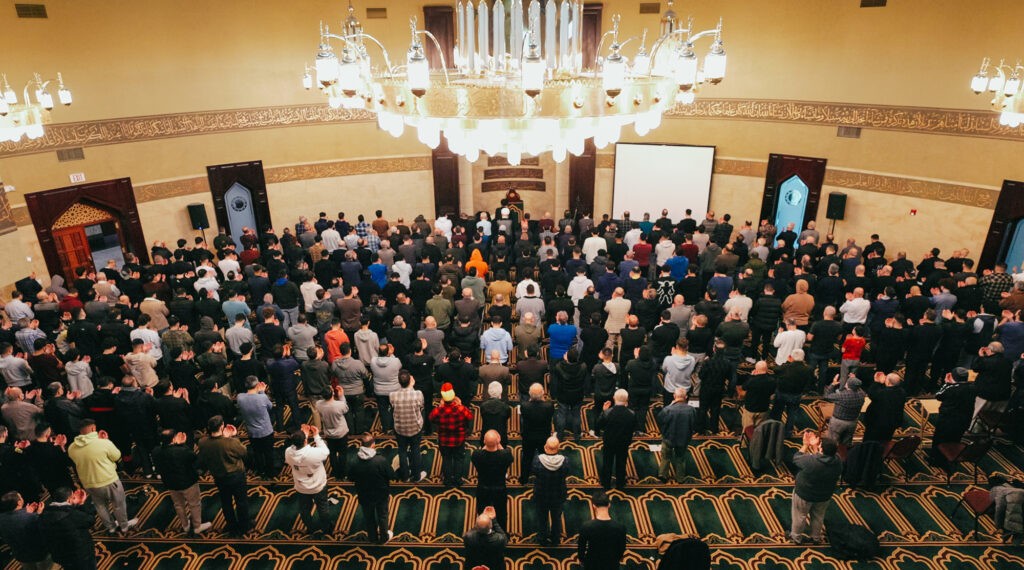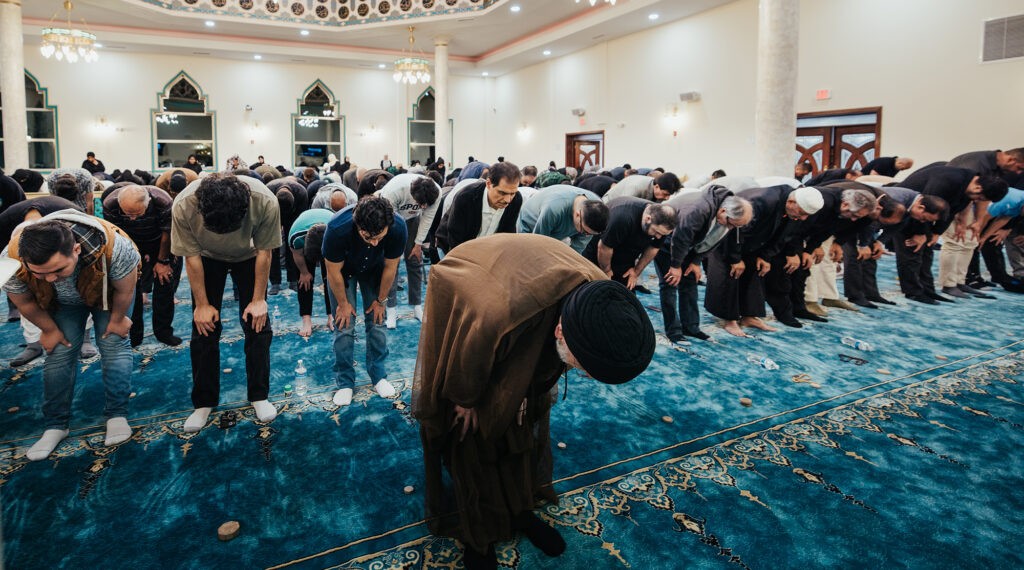Iqamah

How Do You Say the Iqamah?
When we get ready for prayer, one key deed that precedes the actual performance of the prayer is the iqamah. In simple terms, it’s a second call to prayer, very similar to the adhan. However, the iqamah is shorter and is recited immediately before the commencement of prayer.
The iqamah essentially signals that the prayer is about to begin. It’s a final call, telling believers in the congregation that it’s time to stand in rows and prepare for the spiritual journey together, though the iqamah is recommended to be recited when praying alone as well.
Iqamah Meaning: What Is the Difference Between Adhan and Iqamah?
Understanding the adhan meaning and iqamah meaning involves recognizing their central role in Muslim prayer practices. Each serves a specific purpose and timing in the daily rhythm of worship.
Adhan: The Call to Prayer
The adhan serves as the first call to prayer, a melodious public announcement broadcast widely, often via mosque loudspeakers, to inform the community that it’s time to pray. It functions as an announcement, a spiritual reminder, and a means to gather the community for communal prayers, setting the spiritual tone and ensuring that everyone is aware and prepared to participate in the prayer.
Here is what should be said in the adhan:
- Allāhu Akbar, Allāhu Akbar, Allāhu Akbar, Allāhu Akbar
اللهُ أَكْبَرُ، اللهُ أَكْبَرُ، اللهُ أَكْبَرُ، اللهُ أَكْبَرُ
“God is the Greatest.” - Ashhadu al-lā ilāha illallāh, Ashhadu an lā ilāha illallāh
أَشْهَدُ أَنْ لا إِلهَ إلّا اللهُ، أَشْهَدُ أَنْ لا إِلهَ إلّا اللهُ
“I bear witness that there is no deity but God.” - Ashhadu anna Muḥammada’r-Rasulullāh, Ashhadu anna Muḥammada’r-Rasulullāh
أَشْهَدُ أَنَّ مُحَمَّداً رَسُولُ اللهِ، أَشْهَدُ أَنَّ مُحَمَّداً رَسُولُ اللهِ
“I bear witness that Muhammad is the Messenger of God.”
[For the ruling on “Ashhadu anna ‘Aliyyan waliyyullāh,” see #4 in “Key Rulings and Practices” below]
- Ḥayya ‘alā’ṣ-Ṣalāh, Ḥayya ‘alā’ṣ-Ṣalāh
حَيَّ عَلَى الصَّلاةِ، حَيَّ عَلَى الصَّلاةِ
“Hasten to the prayer.” - Ḥayya ‘alā’l-Falāh, Ḥayya ‘alā-l Falāḥ
حَيَّ عَلَى الفَلاحِ، حَيَّ عَلَى الفَلاحِ
“Hasten to the success.” - Ḥayya ‘alā khayr’il-’amal, ḥayya ‘alā khayri’l-‘amal
حَيَّ على خَيرِ العَمَل، حيَّ على خَيرِ العَمِل
“Hasten to the best of deeds.”
- Allāhu Akbar, Allāhu Akbar
اللهُ أَكْبَرُ، اللهُ أَكْبَرُ
“God is the Greatest”
- Lā ilāha illallāh, lā ilāha illallāh
لا إِلهَ إلّا اللهُ، لا إِلهَ إلّا اللهُ
There is no deity but God.”
Iqamah: Call to Stand for Prayer

The iqamah marks the second call and signals that the prayer is about to start immediately. Recited in a quicker, less melodious tone, it indicates urgency. It serves as the final prompt for believers to align and focus, marking the transition from preparation to the actual commencement of the prayer.
The iqamah includes phrases similar to those in the adhan but concludes with a specific phrase about the commencement of the prayer: qad qamatis-salah (“Prayer has been established.”). It indicates that the prayer will start immediately.
Begin by standing up straight, facing the direction of the Qibla (the Kaaba in Mecca). Ensure you are in a state of ritual purity (wudu). Make the intention in your heart that you are about to recite the iqamah for the specific prayer you are about to perform (fajr, zuhr, asr, maghrib, or isha). And then say:
- Allāhu Akbar, Allāhu Akbar
اللهُ أَكْبَرُ، اللهُ أَكْبَرُ
“God is the Greatest.” - Ashhadu al-lā ilāha illallāh, Ashhadu al-lā ilāha illallāh
أَشْهَدُ أَنْ لا إِلهَ إلّا اللهُ، أَشْهَدُ أَنْ لا إِلهَ إلّا اللهُ
“I bear witness that there is no deity but God.” - Ashhadu anna Muḥammada’r-Rasulullāh, Ashhadu anna Muḥammada’r-Rasulullāh
أَشْهَدُ أَنَّ مُحَمَّداً رَسُولُ اللهِ، أَشْهَدُ أَنَّ مُحَمَّداً رَسُولُ اللهِ
“I bear witness that Muhammad is the Messenger of God.”
[For the ruling on “Ashhadu anna ‘Aliyyan waliyyullāh,” see #4 in “Key Rulings and Practices” below]
- Ḥayya ‘alā’ṣ-Ṣalāh, Ḥayya ‘alā’ṣ-Ṣalāh
حَيَّ عَلَى الصَّلاةِ، حَيَّ عَلَى الصَّلاةِ
“Hasten to the prayer.” - Ḥayya ‘alā-l-Falāh, Ḥayya ‘alā’l-Falāḥ
حَيَّ عَلَى الفَلاحِ، حَيَّ عَلَى الفَلاحِ
“Hasten to the success.” - Ḥayya ‘alā khayr’il-‘amal, ḥayya ‘alā khayri’l-‘amal
حَيَّ على خَيرِ العَمَل، حيَّ على خَيرِ العَمِل
“Hasten to the best of deeds.”
- Qad qāmatiṣ-Ṣalāh, Qad qamātiṣ-Ṣalāh
قَدْ قَامَتِ الصَّلاةُ، قَدْ قَامَتِ الصَّلاةُ
“Prayer has been established.” - Allāhu Akbar, Allāhu Akbar,
اللهُ أَكْبَرُ، اللهُ أَكْبَر
“God is the Greatest.”
- Lā ilāha illallāh
لا إِلهَ إلّا اللهُ
“There is no deity but God.”
Key Rulings and Practices:

- Both adhan and iqamah are highly recommended for daily obligatory prayers but not legislated for other than those.
- The adhan consists of 18 sentences, while the iqamah comprises 17. It’s crucial to maintain the correct sequence without long intervals between the phrases. Deviations or unnecessary delays require a repetition of the calls.
- Recitation of the adhan and iqamah that is akin to prohibited singing (ghina) is prohibited.
- The sentence “Ashhadu anna ‘Aliyyan waliyyullāh”
أَشْهَدُ أَنَّ عَلِيًّا وَلِيُّ اللهِ
…can be recited after Ashhadu anna Muḥammada’r-Rasulullāh, even though it is not a part of adhan and iqamah. This is because it is recommended to say it in the adhan and iqamah and in general, as it completes the testimony of faith.
- If adhan has already been called for congregational prayer, individual participants should not repeat it for themselves. Conditions, such as the proximity of the prayer time and the physical location of the prayer, affect whether adhan and iqamah need to be repeated for subsequent prayers.
- The adhan and iqamah must be said by a male in mixed congregations, although women can say them in all-female groups.
- It’s advised to recite adhan in the right ear and iqamah in the left ear of a newborn as an early introduction to the faith.
Contact us here if you have a question about praying.
What Is Iqamat Before Namaz?
Reciting the iqamat before namaz is generally recommended before each of the five daily prayers. It serves as the final signal that the prayer is about to begin, helping to gather and prepare for the prayer.
While it is not compulsory (wajib) in the same way that performing the prayers themselves is, reciting adhan and iqamah for daily obligatory prayers is recommended. For other obligatory and recommended prayers, the recitation of adhan and iqamah is not stipulated in Islamic Law. The iqamah is also recommended for individual prayers, meaning, when one prays alone.
Some might wonder, “Can you recite iqamah in English?” The answer is that, for the iqamah to be correct, it must be recited in Arabic, unlike qunut, which can include English. Still, understanding the iqamah meaning in English (see above) can help non-Arabic speakers appreciate its significance and the role it plays in preparing worshippers to commence their prayer with solemnity and reverence.
The iqamah for fajr prayer is the same as the iqamah for zuhr, asr, maghrib, and isha. So when one gets ready for the day’s first prayer, one should try to perform the iqamah, even if it is early in the morning.
Other Points About Iqamah
The iqamah is recommended, which means you don’t have to do it. It also means that if someone’s iqamah is incorrect or if someone mispronounces some of its letters, it doesn’t impact his salah nor the salah of other participants in a particular congregation.
Still, the iqamah is so valued that it can actually be permissible to start your salah over for it, according to Ayatollah Sistani. Read the relevant question and answer below.
Question: If someone begins prayer and remembers while in the bowing position (ruku) that they did not perform the call to prayer (adhan) and the call to commence (iqama) before takbirat al-ihram (which begins the prayer), is it permissible for them to break the prayer and start again after performing these?
Answer: If the person praying forgets the adhan and iqama before starting the daily prayer, it is recommended (mustahabb) for them to break the prayer and start again after performing adhan and iqamah. However, the level of [istihbab, or, how recommended it is] depends on when he remembered this and whether it is before or after he has begun recitation, before or after ruku, or before he finishes the prayer, for starting over is more preferred in the order of the times mentioned.
This demonstrates the emphasis placed on saying adhan and iqamah. Overall, we can say that reciting the iqamah properly helps one prepare for the prayer, both mentally and spiritually, making it more likely that one begins one’s salah with focus and sincerity.
Reach out to us here with your religious questions, and we’ll get back to you soon insha’Allah!

Leave a Comment:
You must be logged in to post a comment.